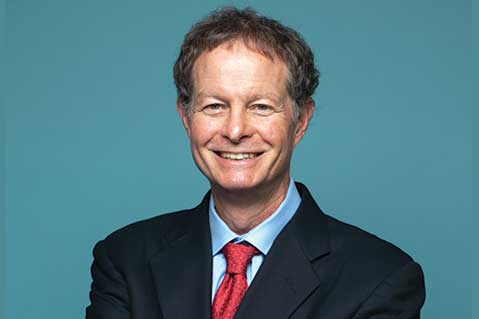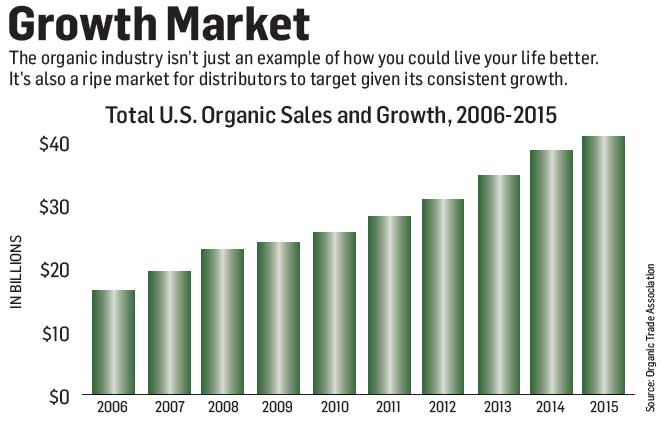Awards February 13, 2017
Q&A: John Mackey, Whole Foods
Whole Foods Co-Founder John Mackey accelerated the organic industry and brought healthy food to millions of people.
Two decades ago, sales of organic products in the U.S. totaled $3.6 billion. Today, it’s over $45 billion. And perhaps no person is more responsible for that staggering growth than John Mackey. The CEO and co-founder of Whole Foods started with a single store in 1980 and grew the natural food grocer into a titan of healthy living, with over 460 locations today and nearly $16 billion in revenue. Organic food is now available in grocery stores and markets around the country due to the demand that Mackey and Whole Foods tapped into.

But Mackey espouses something greater. His book Conscious Capitalism urges businesses to strive for a higher purpose instead of just aiming to make money. An Austin, TX, native and the keynote speaker at ASI Show Dallas, Mackey shares with Counselor some of the secrets that have made Whole Foods a two-decade mainstay on Fortune’s Best Places to Work list, and why he’s never regretted cutting his salary to $1 a year.
Counselor: What is conscious capitalism?
John Mackey: We identify four pillars with conscious capitalism. First, every business has a potential for a higher purpose that goes beyond just making profits. Second, the business should be managed on behalf of all of the interdependent stakeholders: customers, employees, suppliers, investors, communities. Third, you should have a different style of leadership than traditionally has been the case. We believe that it’s more of a servant leadership. The leaders serve the higher purpose of the business; they serve the stakeholders. And fourth, you need to create a culture that really helps people who work for the business to flourish, grow and evolve as human beings and leaders.
Counselor: What are some keys to building that type of corporate culture?
JM: There are a number of factors. The first one, of course, is that the culture should be in some sense an extension of the purpose of the business. Why does the business exist, and what kind of value is it creating in the world? There’s not one perfect culture. It depends on what kind of business you’re in and what its purpose and value creation is.
Secondly, it’s essential that the leadership walks the talk. You can’t just have core values, a higher purpose, principal, things like that, if the leadership doesn’t really believe it and doesn’t lead by example. People will pay a lot more attention to what you do and how you live than what you say.
Generally, a successful culture is one that is going to have greater transparency in it. It’s going to encourage authenticity. It’s going to be one where there’s a greater sense of care and love in the organization, one that has integrity and tries to do the right thing. It’s fundamentally honest and trustworthy. The basic virtues that go into making up a good human being also are the virtues that make up a good organizational culture.
Counselor: How have you been able to develop that culture at Whole Foods?
JM: I would say when we started out we didn’t do it very consciously. We wanted to have a business, and our initial higher purpose at Whole Foods was pretty simple, which was just to sell healthy food to people, earn a living for ourselves and have some fun doing it. And those are still in the DNA of the company. But of course, the purpose has gotten deeper as we’ve gotten bigger and it’s more encompassing.
Then we also wanted to create a culture that we ourselves would want to work in. We thought about what we didn’t like. We wanted to make sure we didn’t replicate that. We didn’t want to attract leaders who were primarily into power over others, or who were more interested in their own compensation. So we had to establish the basic cultural elements of transparency, authenticity.
For example when I say transparency, at Whole Foods Markets what everybody gets paid is in the public realm. We don’t keep that hidden away. We want to empower our team members about the financial situation – not only of the company, but of their particular work unit so they can see how they’re doing. They want to link their own bonuses into how well the company and business unit are doing. So we reward people both at the micro level and the store level.
Frankly, most cultures, they’re sort of taken for granted. It’s one of my most important jobs to look at the culture. To use a metaphor, it’s like your garden, you’ve got to root out the weeds and bad elements, and you’ve got to nurture the virtues and plants that you want to grow.
Counselor: Ten years ago you decided to cut your salary to $1 a year. Have you ever regretted that decision?
JM: I never personally regretted it. I’d have to say my wife regretted it back in 2008 when everything was crashing down. She was like, ‘why the heck did you cut your salary to $1? You should get your salary back. We kind of need the money,’ and I said, ‘I can’t do that. I would be a laughingstock. We’re just gonna have to struggle through this and we’ll get to the other side of it.’ So I’ve never had any regrets. I’m actually glad I did it, because it makes it very clear to everybody at the company that I’m not in it to maximize my own personal gains, but to serve the company to help it reach its highest potential. It takes self-interest off the table when people want to ask questions about that. I’m not saying anybody else should necessarily do it, but it worked out well for me and Whole Foods.
Counselor: I wanted to ask you about your dad, who helped you start the company. Did you approach him with this idea of a natural and organic supermarket?
JM: I did. I was very young. I think I was 24 when I pitched my dad about starting a store. I had absolutely no background in business whatsoever. I studied philosophy and the humanities when I was in school and actually never took a degree. I just took electives. My dad had been an accounting professor at Rice University and then he’d gone into business, and so it was really good because he and I got really close and worked together very effectively for about 16 years.
But he was initially pretty skeptical. He said “Are you sure that’s what you want to do? You want to be a grocer? Organic foods, what’s that?” This is back when almost nobody knew what organic meant and it was all seen as very weird stuff. But I was so enthusiastic about it. I was so excited about it. I found my life’s passion. My dad went along with it. He loaned me $10,000 to put into the business, and we capitalized the business initially with $45,000 from friends and family like a lot of startup businesses. And we managed to lose half that money in the first year, I might add, before I learned enough to turn it around and make the business profitable in year two.

Counselor: What is the best advice you have for entrepreneurs?
JM: Ultimately, it’s about value creation. What kind of value can you create in the world that people want? Is your idea an idea that other people are gonna embrace? And if so, you gotta go for it. Most entrepreneurs I’ve known are very passionate people that usually have a dream they’re trying to realize. So my biggest advice is encouragement to do it.
I’ll tell you a story. Oftentimes when I talk at business schools I will take a quick poll. These are mostly MBA students getting their masters in business administration. And I’ll ask the class how many of them plan to start their own business some day. And about 75%-90% of the people raise their hand. And then I follow-up and ask how many of them plan to do that immediately after they get their MBA. Most of the hands go down.
Usually only a few stay up. And then I’ll tell them, the people that still have their hands up, they’re the ones that are going to create their own businesses. And the rest of them are probably kidding themselves. Because they’re gonna go into consulting, or they’re gonna get hired by Goldman Sachs or investment banks or consulting firms. And they’re gonna make big salaries and they’re probably not gonna go start a business someday because they’re just gonna go down a different track.
So my advice if you’re an entrepreneur is get on with it. Stop wasting time and get on and build your business. Create your dreams. Follow your heart and live a life with passion. It may not work out for you, but if you’re true to yourself, it probably will.
